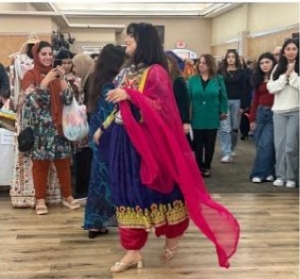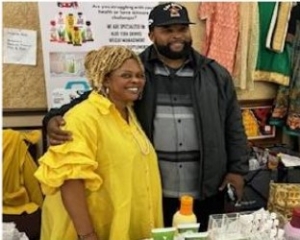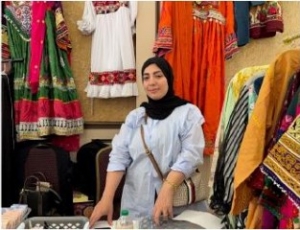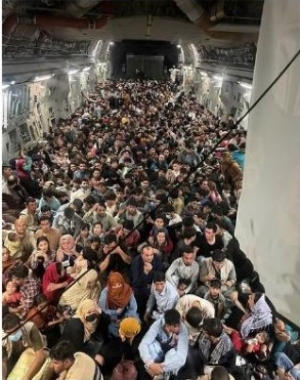 Photo: Shoppers browse wares during United We Stand Bazaar at The Palms In El Cajon
Photo: Shoppers browse wares during United We Stand Bazaar at The Palms In El CajonBy Alexander J. Schorr
Photos by Alexander J. Schorr and Miriam Raftery
May 19,2025 (El Cajon) -- Refugees who fled violence and persecution in their homelands and later started up business locally came together at the “United We Dreams” Bazaar at The Palms in downtown El Cajon on Sunday May 18.
All have one thing in common: the El Cajon-based nonprofit License to Freedom, helped them start up their businesses and achieve self-sufficiency and sanctuary.
At the bazaar, these refugee entrepreneurs donated 100 percent of their sales proceeds to License to Freedom, assuring that new refugees will have similar opportunities to attain the American dream.
Helping refugees become proud Americans
The group's outreach efforts are focused on helping its members relate to cultural adjustments to American healthcare norms. This organization was founded in 2002 by Dilkhwaz Ahmed, a Kurdish Immigrant with a background in psychology who was a women’s rights activist in Iraq.
 Photo, right: Dilkhwaz Ahmed, founder of License to Freedom, expresses joy at the outpouring of support for local refugees and immigrants at the event.
Photo, right: Dilkhwaz Ahmed, founder of License to Freedom, expresses joy at the outpouring of support for local refugees and immigrants at the event.“All of these people are great and good,” says Ahmed, founder of License to Freedom, who aims “to help them” by putting them into the immigration process quickly through an attorney, as well as providing support to start up businesses.
This lively marketplace featured handmade crafts, traditional food and music, cultural dances and small business booths run by immigrants and refugees from the community. Local handmade objects were on sale at the small business booths like clothing, bags, candles, housewares, food, and skin care items.
Some participants joined in dancing to ethnic music. The Blue Nile Sisters, belly-dancers, also performed at The Palms for the entertainment of roughly 300 people.
 Photo, left: A woman dances in traditional Afghan attire that would not be permitted in Afghanistan under the Taliban, a conservative religious sect that requires women to wear burkhas.
Photo, left: A woman dances in traditional Afghan attire that would not be permitted in Afghanistan under the Taliban, a conservative religious sect that requires women to wear burkhas.Vendors and their stories
One of the many vendors was Marwah Rameed, an independent creative artist who specializes in jewelry and custom creations.
“I am from Iraq — I am a single mom here,” she said. “I have two kids, and I am a student also. This one — this all started as a hobby, and then it became a business.”
She illustrated that much of her customizable wares and jewelry items are magnetic and utilize jesmonite, an eco-friendly resin material that is safe and easy to use for a variety of creative projects, including art, design, and construction. It is a water-based casting medium, and is less harmful to the environment than traditional resins.
Photo, right: Angela and Francois Abla, Forever Health & Beauty business owners

Angela and Francois Abla together owned a skin care and dietary company. Angela met her husband Francois here in America, with Angela originating from Togo, officially the Togolese Republic, a country in West Africa.
Her husband served in the U.S. Navy, with Angela expressing how License to Freedom helped start her business: “this is a new business course.”
Francois illustrated that they often used their products for massage as well as promoting beauty, youthful skin… and weight loss.
“Forever Health & Beauty” is a skin care company, specializing in weight management, aloe vera drinks, perfumes, vegan products and nutritional supplements.
Sharmin Tahir, owner of “Sew Happy,” came to the U.S. from Kurdistan, where Kurdish culture, languages and national identity have been historically based.
“Sew Happy Sewing Studio,” which is described as “dedicated to fostering creativity, confidence, and connection through the art of sewing and craft making,” is a business that gives sewing lessons for children and adults, seasonal camps, birthday parties, and specializes in homemade arts and crafts.
According to Tahir, “when I was four years old, my family had to leave basically because of a genocide. Through my dad, we came here — we found refuge. I don’t remember much, but I remember the good stuff, so I’m grateful, and I'm so grateful to be here too, because it's the land of opportunity. For all of us I hope.”
Many of the vendors came here as refugees from Afghanistan.
 One woman (photo, left) offered brightly colored, intricately detailed traditional Afghan clothing which can no longer be worn today in Afghanistan under Taliban rule.
One woman (photo, left) offered brightly colored, intricately detailed traditional Afghan clothing which can no longer be worn today in Afghanistan under Taliban rule.She told East County Magazine she “misses her homeland deeply, but… it is impossible to return.”
Afghans Facing Persecution Once More — this time, in the U.S.
Some Afghans in the U.S. likely will be forced to return to their war-torn homeland, due to the vehement crackdown on immigration and new deportation tactics.
President Donald Trump’s new order takes away temporary protected status (TPS) for Afghan refugees, putting as many as 9,000 Afghans at risk of deportation, including many who helped the U.S. military, such as translators.
Photo, right: U.S. military transport plane evacuated fleeing Afghans when the Taliban took control of Afghanistan in 2021, after U.S. troops pulled out

The Trump administration has stated that “their country is no longer dangerous for them,” a sentimental confounding Afghanistan experts, since sending Afghans back to Afghanistan clearly would expose them danger, potential execution, and deprivation of rights for women.
Homeland Security Secretary Kristi Noem’s assertion about safety left advocates pondering where the DHS was getting its information.
TPS has allowed them to stay in the U.S. legally. Zia Ghafoori, a U.S. Army Special Forces interpreter in combat, has stated, “It's a death penalty for them if they return” to their place of origin.
Bill Frelick with Human Rights Watch called the move to revoke the status for Afghans a “betrayal of US commitments,” adding, “The only justification for revoking temporary protected protection would be if permanent protection was being offered, since Taliban rule clearly makes returns unsafe.”
Last month, the Trump administration’s Dept. of Homeland Security similarly attempted to revoke TPS for Venezuelans, a move that was challenged and paused by a federal judge on March 31, who stated that these types of behaviors and policies would “inflict irreparable harm” on TPS recipients.
Ironically, while the Trump administration has sought to take away protected status for primarily immigrants and refugees of color, while refusing entry for Black refugees fleeing war and famine in African nations, the administration recently welcomed white South Africans as refugees under an executive order mandating that they be prioritized for resettlement.
When in power, the Afrikaners imposed racist Apartheid policies subjugating non-white South Africans.
South Africa’s president and global media outlets have reported that the Afrikaners' claims of genocide are false, while claims imminent danger made by many non-white Africans seeking refugee status are clear and indisputable.
Those at the United We Stand bazaar are fortunate to have been able to come here as refugees and immigrants before the current policies barred future waves of refugees from finding freedom and safety in America.










Comments
Donald Trump...